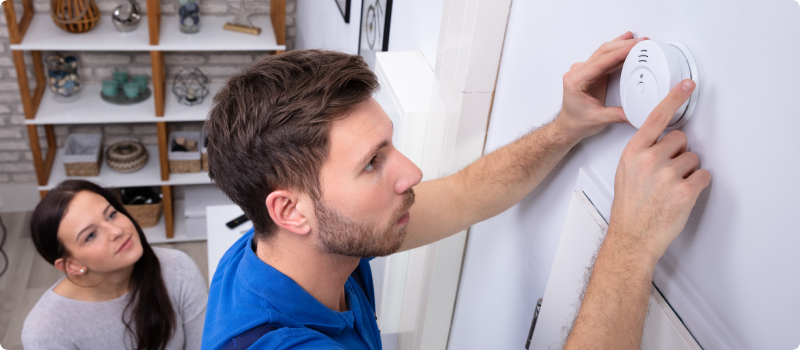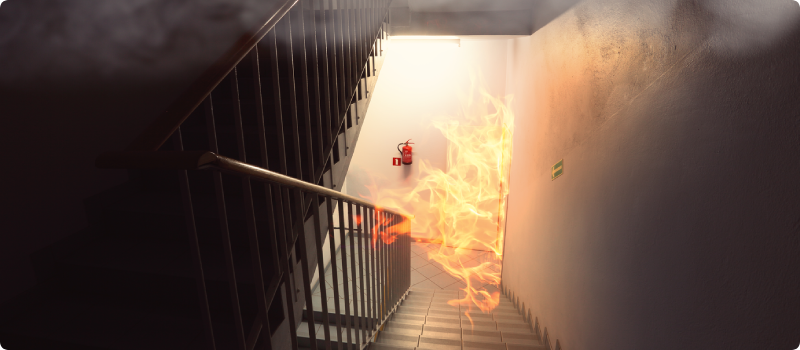What Is a landlord responsible for?
Updated November 1, 2021 . AmFam Team
Whether you rent an apartment, duplex, house or other unit, your landlord has certain responsibilities regarding its condition, making repairs and more. Check out our list of landlord responsibilities and make sure they’re holding up their end of the rental agreement.
Maintaining the condition of your rental unit
Your landlord must keep your unit and other areas of your complex or building habitable and safe for all tenants. Here’s what that means:
They must comply with local building and health codes. This means that your landlord has to keep your building up to certain standards, including making it accessible for people with disabilities, making sure it’s free of things like mold, having functional fire detectors and sprinklers and more. Codes may vary from state to state and in different cities, towns and localities.
The unit must have functioning plumbing, water and heat. While different localities may have different rules for your plumbing, water and heating, your landlord is responsible for making sure your unit has all three in working order at a bare minimum. Make sure to notify your landlord as soon as you have any issue with any of them.
They must make timely repairs. When a unit needs repair, your landlord must take action to fix it promptly — especially in the case of human necessities like water and heat. Make note of when you notify your landlord of something in need of repair in your rental unit.
Your unit should be free of pests. Everyone’s heard the horror stories of pests invading their living space and the unanswered phone calls to an unaccommodating landlord. Your landlord is responsible for keeping their units and common areas free of such nuisances. If you notice any sort of infestation, notify your landlord immediately as they can cause sickness or disease. Make sure you do your part to keep pests away, too, by keeping your unit clean and taking out the trash regularly.

Keeping tenants as safe as possible
Going hand-in-hand with habitability is safety. Your landlord is required to do their part to keep you safe in your unit and on the property as a whole. Here’s what they need to do:
Keep the property well-lit. Entryways, doorways, hallways and common areas must be well-lit to keep tenants from slipping, falling or other unsafe situations. And when a light burns out in a common area, let your landlord know right away.
Make sure entry doors have functional locks. Whether it’s to your particular unit or your building as a whole, the door should have locks that only allow tenants and their guests to safely enter. In addition, your landlord should change your unit’s locks if a key goes missing, an old tenant didn’t turn in all their keys when they moved out or if there’s been an unauthorized entry to your unit.
Have all emergency systems in working order. Depending on your type of unit, your landlord should make sure all applicable fire alarms, fire escapes, smoke detectors and other emergency equipment are fully functional.
You can also be proactive about your safety and check out these safety tips for your apartment.
Other landlord responsibilities
Outside of basic necessities and safety, your landlord still has other responsibilities that are crucial to your comfort and privacy. Check them out:
Keeping a quiet living environment. Your landlord should do their best to rent to respectful tenants who don’t disturb others with excessive noise. If you have apartment neighbors or someone on the other side of your duplex, your landlord should have clear quiet hours that allow everyone to get the rest they need.
Be honest and fair with your security deposit. Different localities may have different rules, but in most areas, your landlord should return your security deposit unless they’ve made specific repairs or incurred some sort of loss that you caused with the unit. Most landlords are required to specify why they withheld any portion of your deposit in detail, too.
Give plenty of notice before they enter your unit. A landlord cannot show up without cause and/or without notice and enter your living space. Laws differ from place to place, but your landlord should give you notice before they plan to enter to make repairs, show your unit to a potential renter or any other reason. Doing so without permission or notice is an invasion of your privacy and a potential breach of your lease agreement.

What does my landlord’s insurance cover?
Understanding what your landlord’s insurance covers can help you also better understand why renters insurance is so important!
Your landlord is responsible for property damage, like if a fire or storm damaged or destroyed the structure of the building. They are not responsible for replacing your personal property, like furniture, clothing, electronics, etc., due to events like these. That’s what your renters insurance is for!
They also are responsible for liability damages, like if you were to fall and injure yourself due to an icy walkway on the property. However, if you have a guest over and they are injured, it’d typically be your renters insurance that would cover any related medical costs or other fees.
You can do your part and protect yourself from the unexpected with renters insurance from American Family. Additionally, your American Family Insurance agent is always happy to help you protect what matters most — get in touch with them today.
This article is for informational purposes only and based on information that is widely available. This information does not, and is not intended to, constitute legal or financial advice. You should contact a professional for advice specific to your situation.
This information represents only a brief description of coverages, is not part of your policy, and is not a promise or guarantee of coverage. If there is any conflict between this information and your policy, the provisions of the policy will prevail. Insurance policy terms and conditions may apply. Exclusions may apply to policies, endorsements, or riders. Coverage may vary by state and may be subject to change. Some products are not available in every state. Please read your policy and contact your agent for assistance.

